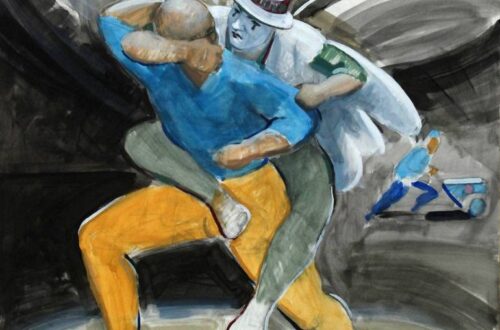Bible Studies
-
Ezekiel 26-28
Three weeks ago we met the young Ezekiel who is called to be a whistleblower and to expose the corruption and degradation of the priests and leaders of those who have been left behind in Jerusalem. Instead of deliverance from Nebuchadnezzar they are going to be overwhelmed by his armies. God has left the Temple and Jerusalem. All that will remain in Jerusalem is what will remain in this world when the Church departs – a world without pity, mercy, justice, hope or pleasure. Only complete delusion. Evil that has been boiling below and ever present in the world will be revealed. What has been hidden will be obvious. In…
-
Ezekiel 16
We are now into our third week of Ezekiel. Two weeks ago we saw Ezekiel’s first vision of God on his throne and read about Ezekiel’s call to be a prophet – and a whistle blower commanded to expose the sins of the priests of Israel who were his father’s peers and the men to whom he had looked for wisdom and guidance. “The priests have desecrated the Temple and have not spoken for God. People without leadership from their priests will always begin to follow idols. They will fall into the sins of greed and corruption but it is even worse when the religious leaders join and encourage them…
-
Ezekiel 8-12
We left Ezekiel last week bound with ropes and unable to speak while under house arrest as the elders did not want him speaking to the people. That didn’t stop him from acting out God’s message to the leaders in exile. Because they had desecrated the Temple, God’s judgment was upon those remaining in Jerusalem and they would soon be overwhelmed by the Babylonian army. The fast approaching siege would be horrible. “Outside is the sword, inside are plague and famine..Calamity upon calamity will come, and rumor upon rumor. They will try to get a vision from the prophet; the teaching of the law by the priest will be lost,…
-
Ezekiel 1-7
There is not a book in the Bible with a more dramatic beginning than Ezekiel. In my thirtieth year, in the fourth month on the fifth day, while I was among the exiles by the Kebar River, the heavens were opened and I saw visions of God. On the fifth of the month—it was the fifth year of the exile of King Jehoiachin— the word of the Lord came to Ezekiel the priest, the son of Buzi, by the Kebar River in the land of the Babylonians. There the hand of the Lord was on him. I looked, and I saw a windstorm coming out of the north—an immense cloud…
-
Introduction to Ezekiel
For the next several weeks we are going to be in the books of Ezekiel and Daniel. I have never studied or taught either of them. Likely, some of you have spent more time in each of them than I have. So, I am a beginner. What Thomas Merton said is true: We do not want to be beginners. But let us be convinced of the fact that we will never be anything else but beginners, all our life! It would be far easier to skip the assignment and tell myself that at this point in my life it makes more sense to go back to what is familiar and work…
-
Break Bread and Give Thanks
Let’s start with a few facts and a little history. This week Americans will eat 365 million pounds of turkey; 250 million pounds of potatoes; 77 million pounds of ham; 17 million pounds of fresh cranberries; spend $42 million on canned cranberries; spend $96 million on bread crumbs for stuffing; and purchase 483,000 pounds of pumpkins for pie. That doesn’t include everything else we have like olives, pickles, pecan pie, and millions of marshmallows for 57 million pounds of sweet potatoes we will eat. That’s a long way from the original Thanksgiving dinner celebrated by the 50 survivors of the original 102 passengers of the Mayflower in 1621. They were…
-
Colossians 4
Here we are at the end of one of the several letters Paul has written from his two year imprisonment in Rome – Colossians, Ephesians, Philippians, Titus and Philemon. As we’ve said before, prison produces different effects in people. For some, they give themselves up to bitterness and resentment. For others, their lives are permanently dulled and slowly destroyed. For some, however, it produces greatness. Victor Frankl wrote of his confinement in the German death camp during WWII: The way in which a man accepts his fate and all the suffering it entails, the way in which he takes up his cross, gives him ample opportunity—even under the most difficult…
-
Colossians 3:18-21
It’s remarkable to me that Paul can move so quickly from arguing against the heresy of Gnosticism and how Christ is the image of the invisible God, the firstborn over all creation to the most practical human concerns and relationships. He is not a scholar in the ivory tower. “For by him all things were created: things in heaven and on earth, visible and invisible, whether thrones or powers or rulers or authorities; all things were created by him and for him. He is before all things and in him all things hold together..For God was pleased to have all his fullness dwell in him, and through him to reconcile…
-
Colossians 3:1-17
Doesn’t it seem a bit ironic that after telling them to avoid people who have lists of rules to obey he would then create a list of rules of his own for us to follow? Paul was a teacher and teachers often depend on lists – especially lists that people can easily memorize and use as guides for their behavior. Of course, the shorter the better but sometimes Paul had fairly lengthy lists that we often had to recite in Sunday School. There are negative lists: Romans 1: They have become filled with every kind of wickedness, evil, greed and depravity. They are full of envy, murder, strife, deceit and malice.…
-
Colossians 1:24-2:20
The earliest Church may have stayed pure and all of one mind sharing everything with each other for a few days or weeks but it soon faced the realities of imperfect human nature. Yes, they were all believers and what would later be called Christians but the perfect harmony could not last for long. “They devoted themselves to the apostles’ teaching and to the fellowship, to the breaking of bread and to prayer. Everyone was filled with awe, and many wonders and miraculous signs were done by the apostles. All the believers were together and had everything in common. Selling their possessions and goods, they gave to anyone who had…


